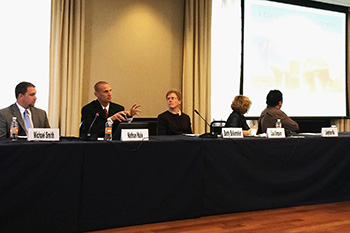AcademyHealth features Arnold School research on South Carolina’s transition of clinical services from health departments to primary care providers
November 7, 2014

Nathan Hale and Michael Smith present their findings at the AcademyHealth Close-Up Briefing on October 21.
The research of Nathan Hale, from the Department of Health Services and Policy Management, and colleagues Michael Smith (South Carolina Department of Health and Environmental Control) and James Hardin (Department of Epidemiology and Biostatistics) was featured during a Close-Up Briefing held by AcademyHealth in Washington, D.C. in October.
AcademyHealth, a leading organization for health service and policy research, sponsored the event to bring together experts from public health research, practice and policy to focus on the impact of funding reductions and policy changes on maternal and child health outcomes. The briefing was part of an ongoing effort by AcademyHealth to disseminate the latest science on public health services and systems issues and identify additional gaps in knowledge.
With support from the Robert Wood Johnson Foundation, Dr. Hale and colleagues examined children’s use of Early Periodic Screening, Diagnosis and Treatment (EPSDT) services in South Carolina over a 15-year period. During this time, local health departments transitioned from providing these services directly to leveraging community provider resources.
They found the impact of this transition varied greatly between urban and rural communities. In communities with adequate community-based primary care capacity, shifting clinical services from health departments to community providers had a marginal impact. Children’s access to these services improved over the long run in these communities. However, in rural and underserved communities, children’s access to care deteriorated, reflecting a greater reliance on health departments as direct providers of clinical services.
These findings are relevant to larger discussions about the organization and delivery of public health services but also highlight the persistent vulnerabilities in access to important health services in some communities, even when insured.



_01.jpg)
_02.jpg)